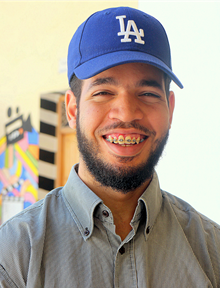October 2017—Newborn baby Moncef El Fihri was found all alone on a street in the Moroccan city of Fes and taken to an orphanage. There, other boys without families grew to be his brothers.
Quiet and serious, the child was loved by all. He was very popular among foster families who hosted orphans during holidays and religious celebrations. At the age of 17 and almost a legal adult, El Fihri had to start preparing for a life on his own, which meant ending his schooling and leaving the orphanage. Without a plan, he felt helpless and desperate.
Wandering aimlessly in a haze of panic, El Fihri caught a glimpse of hope when he stumbled upon the vocational training program at Assadaka, a USAID-supported neighborhood association that pulled him off the streets and onto a promising path. Through career counseling services, he was encouraged to join a construction electricity workshop, where he not only gained technical expertise, but he also learned work readiness and life skills. Following the one-year electricity certification program, the association helped him find affordable housing in the neighborhood while he continued to attend classes. El Fihri finally felt like he had a purpose and a future.
With certificate in hand, El Fihri completed odd jobs around the neighborhood to earn a living wage. He soon found a job at a company manufacturing car parts and has been working there ever since. Although he now earns a decent wage and is more independent, El Fihri, now 22, will never forget where he came from: He regularly visits the orphanage, his first home and family.
Through the orphanage, El Fihri met Yousra, the love of his life, while celebrating a religious holiday with a neighborhood foster family. With a well-established reputation in the neighborhood as a kind, hard-working young man, he recently asked for her hand in marriage. The couple held their wedding reception at Assadaka, his second home, surrounded by his adopted brothers from the orphanage, the neighborhood foster families, and his mentors. For the first time, El Fihri imagined it would be possible to make a family of his own.
“If it was not for this program, I would have ended up as alone and desperate as when I was abandoned at birth. But now I am on my way to build my own little family that I will cherish for a lifetime,” he said.
USAID’s Favorable Opportunities to Reinforce Self-Advancement for Today’s Youth (FORSATY) program runs from 2012 to 2019 and is implemented by the International Organization for Migration. The program is designed to give marginalized youth opportunities to become integrated, productive citizens. To date, the program has reached over 20,000 at-risk youth.
LINKS
Follow @usaidmorocco, on Facebook, on Flickr, on YouTube
,“If it was not for this program, I would have ended up as alone and desperate as when I was abandoned at birth.”

USAID/FORSATY
Primary TextIf it was not for this program, I would have ended up as alone and desperate as when I was abandoned at birth.”

